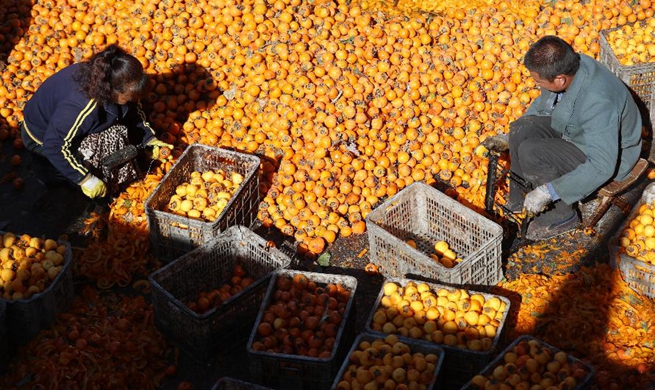STRASBOURG, France, Oct. 24 (Xinhua) -- The European Parliament in Strasbourg overwhelmingly backed a ban on single-use plastics by 2021 in a Wednesday vote aimed at tackling the growing problem of marine litter.
Supporting the draft measures by 571 votes to 53, with 34 abstentions, Members of European Parliament targeted items such as plates, cutlery, straws, balloon sticks or cotton buds, which make up over 70 percent of marine litter, according to statistics published by the European Commission.
Under the new measures, they would be banned in the European Union by 2021.
"We have adopted the most ambitious legislation against single-use plastics," said Frederique Ries, the European Parliament's rapporteur for the draft measures.
"Today's vote paves the way to a forthcoming and ambitious directive. It is essential in order to protect the marine environment and reduce the costs of environmental damage attributed to plastic pollution in Europe, estimated at 22 billion euros by 2030," she said.
MEPs, meeting in Strasbourg for a plenary session, added oxo-degradable plastics, such as bags or packaging and fast-food containers made of expanded polystyrene, to the list to be banned.
REDUCTION OBJECTIVES
In addition to the banned plastics, MEPs set out national targets for other items, without alternatives, requiring a 25-percent reduction in member states by 2025.
These items include single-use burger boxes, sandwich boxes or food containers for fruits, vegetables, desserts or ice creams. EU member states will also need to draft national legislation to promote the use of reusable products.
Additional plastics, such as beverage bottles, will need to be collected separately and recycled at a rate of 90 percent by 2025, MEPs said in their resolution.
CIGARETTE BUTTS
The second most common single-use plastic item found on European coastlines -- discarded cigarette butts with filters including plastic -- was also targeted by MEPs.
Under the new measures, they would have to be reduced by 50 percent by 2025 and 80 percent by 2030.
According to European Parliament research, one cigarette butt can pollute between 500 and 1000 liters of water, and if thrown on the roadway, it can take up to 12 years to disintegrate.
The measures would also require that member states ensure that at least 50 percent of lost or abandoned fishing gear containing plastic is collected per year, with a recycling target of at least 15 percent by 2025.
Fishing gear represents 27 percent of waste found on Europe's beaches, according to European Commission figures.
Member states, under the new regulations, would also need to ensure that tobacco companies and producers of fishing gear that uses plastic should pay for collection costs, as well as the cost of meeting recycling targets.
Having backed the draft measures, Members of European Parliament will next have to enter into negotiations with the European Council, whose ministers will have to establish their own position on the ambitious targets set in Strasbourg.
More than 150 million tons of plastics are present in the world's oceans, according to the European Parliamentary Research Service, with an additional 4.8 million to 12.7 million tons entering the oceans every year.
Plastic marine litter contributes to damages to marine life, has strong economic impacts due to clean up costs and damages to both fishing and tourism, and may contribute to climate change and human health issues.












